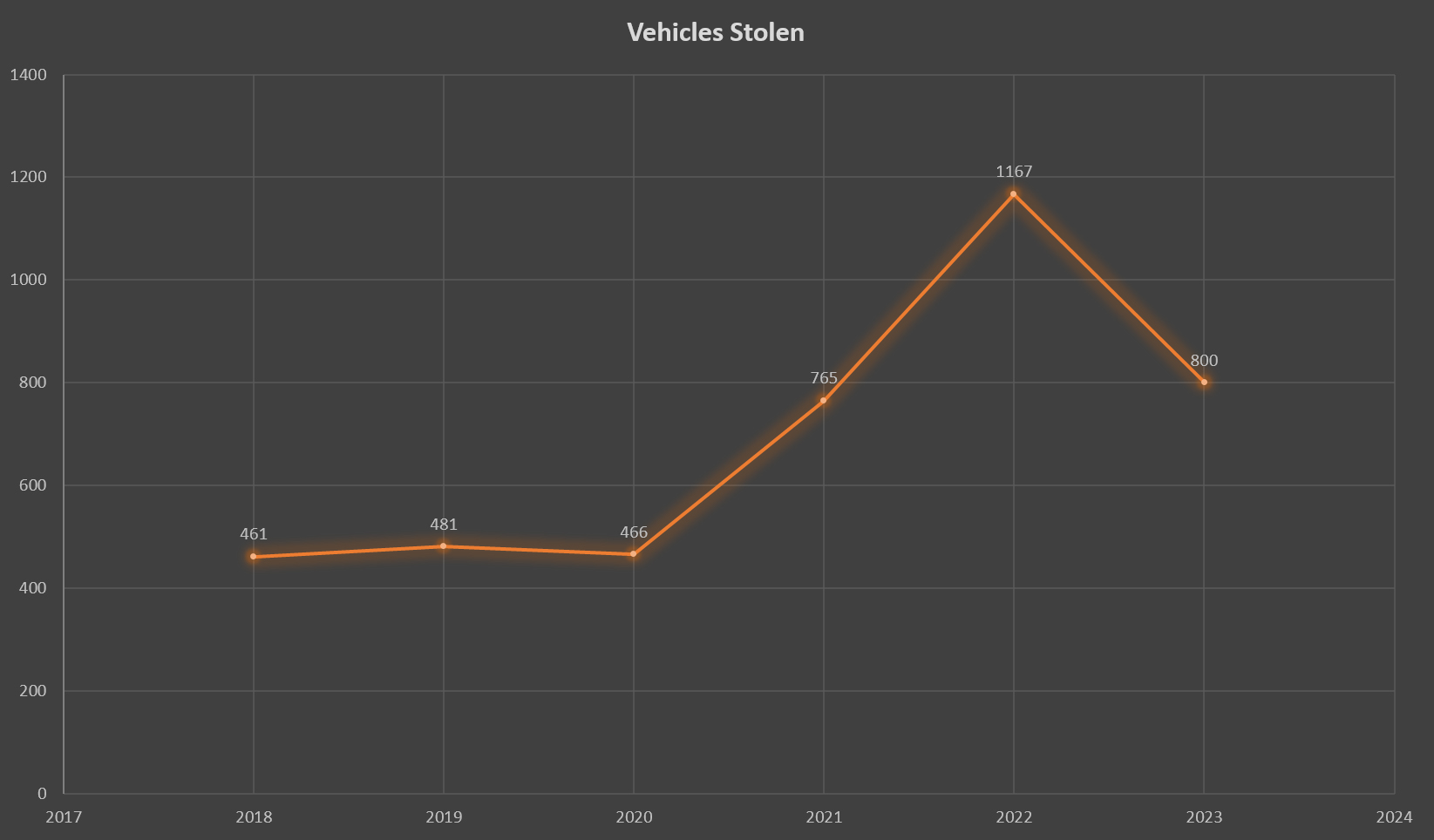
Motor vehicles are an essential part of our day-to-day lives and are of high-value.
In recent years, Halton Region and beyond have experienced a dramatic rise in auto theft occurrences. The increases coincide with an ongoing global vehicle shortage brought about by the COVID-19 pandemic, which made stealing them a lucrative revenue stream for organized crime.
| What We Are Doing |
|
Our Service (HRPS) is committed to addressing auto theft, and is devoting considerable resources to a multi-pronged approach, which includes response, education, partnerships and social development to combat it at home and beyond.
Response - In January 2023, we launched a Regional Auto Theft Task Force comprised of dedicated investigators from across the organization. In its first four months in operation, the team recovered almost 400 stolen vehicles, arrested more than 50 individuals, and laid almost 240 related criminal charges. For the latest auto theft news and information, subscribe to receive media releases or follow us @HaltonPolice on Twitter, Facebook and/or Instagram. Education - Efforts are ongoing to educate members of the public on measures they can take to help prevent their vehicle(s) from being stolen. These include organizing town halls, as well as issuing targeted letters to owner of vehicles most at risk. Partnerships - In recognition of the complex, transborder nature of auto theft, and to ensure the best response to it, we have – and continues to – partner with police agencies throughout Ontario, the Canada Border Services Agency (CBSA) and RCMP, all levels of government, with manufacturers, as well as with insurance bureaus. Earlier this year, our Service joined law enforcement agencies and industry stakeholders at a national Auto Theft Summit aimed at strategically targeting auto thieves. We have also launched Project Oxygen. Project Oxygen, a partnership with automobile dealerships in Oakville, Burlington and Milton, encourages residents to place third-party trackers (such as an Apple Air Tag, Tile, Galaxy Smart Tag or Atuvos) inside their vehicles to increase its chance of being recovered in the event it is stolen. Read the Project Oxygen media release to learn more. Social Development - We have also included auto theft as part of our educational outreach to youth in Halton schools who may be vulnerable to recruitment by organized car thieves. |
| By The Numbers |
|
Figures released in our Service’s 2022 Annual Report revealed that in the past year alone, more than 1,100 vehicles were stolen - up from around 850 the year prior.
|
| How It Happens |
|
The two most common ways vehicles are currently stolen and re-sold is through reprogramming and/or re-vinning. Reprogramming In this most common type of auto theft, thieves target high-end, newer-model vehicles with keyless entry and push-start technology. The majority of these vehicles are parked in residential driveways and are taken during the overnight hours. Reprogramming thefts occur when thieves take an image of an automobile’s Vehicle Identification Number (VIN) – which is visible through the front windshield – and pre-load it into a reprogramming device. Vehicles are then entered by force to access their diagnostic system/electronic control modules. Within minutes, thieves are able to reprogram a vehicle, activate its ignition, and drive off. Many of the vehicles are driven to the Port of Montreal or are loaded into cargo containers in Toronto and transported to Montreal by rail. The stolen vehicles are then shipped overseas for re-sale. Re-vinning Re-Vinning involves changing a vehicle’s Vehicle Identification Number (VIN) to a fraudulent/fabricated number to conceal the fact that it is had been stolen. Ontario Motor Vehicle Industry Council (OMVIC) administers and enforces the Motor Vehicle Dealers Act, as well as relevant sections of the Consumer Protection Act on behalf of Ontario’s Ministry of Public and Business Service Delivery (MPBSD). Its aim to protect the rights of consumers and ensure fair, honest, and open competition for registered motor vehicle dealers. For steps youcan take to help prevent and/or avoid falling victim when purchasing a pre-used vehicle, visit OMVIC: Buying a New or Used Cars in Ontario | Car Buying Tips |
| Prevention |
|
There are a number of measures you can take to decrease the chance of losing your vehicles to auto theft:
You can also take steps to reduce the likelihood of purchasing a re-vinned vehicle:
Tips provided by Ontario Motor Vehicle Industry Council (OMVIC) |
| Reporting Auto Theft |
|
Help us help you. We need you to be our eyes and ears. Call 905-825-4777 if your vehicle is stolen or if you see suspicious vehicles or people (unfamiliar, unusual, loitering) in your neighbourhood. Tips can also be submitted anonymously to Crime Stoppers. "See something? Hear something? Know something? Contact Crime Stoppers" at 1-800-222-8477 (TIPS) or through the web at www.haltoncrimestoppers.ca. Call 911 if you witness a crime in progress. |
| Latest Information |
|
For the latest auto theft news and information, subscribe to receive media releases or follow us @HaltonPolice on Twitter, Facebook and/or Instagram. |
| Additional Information |
Download a PDF version of these Vehicle Theft Prevention Tips.
Contact Information
Email: autotheft@haltonpolice.ca
 I Want To
I Want To





 Subscribe to this Page
Subscribe to this Page